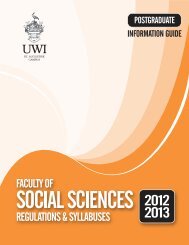Faculty of Humanities and Education (Postgraduate) - The University ...
Faculty of Humanities and Education (Postgraduate) - The University ...
Faculty of Humanities and Education (Postgraduate) - The University ...
You also want an ePaper? Increase the reach of your titles
YUMPU automatically turns print PDFs into web optimized ePapers that Google loves.
POSTGRADUATE REGULATIONS & SYLLABUSES 2012 - 2013<br />
THE FACULTY OF HUMANITIES & EDUCATION<br />
Master in <strong>Education</strong><br />
(Health Promotion)<br />
OBJECTIVES OF THE MASTER IN EDUCATION<br />
(HEALTH PROMOTION)<br />
• To develop a sound knowledge base <strong>and</strong> a strong sense <strong>of</strong><br />
intellectual inquiry for working with people <strong>of</strong> all ages on<br />
issues relating to health promotion, <strong>and</strong> health <strong>and</strong> human<br />
relationships in the Caribbean<br />
• To develop strong practical skills to address issues relating<br />
to health <strong>and</strong> human relationships in a variety <strong>of</strong> settings<br />
(individual, group, family, classroom, <strong>and</strong> population-level<br />
policy <strong>and</strong> programme development)<br />
• To develop monitoring, evaluation, <strong>and</strong> research<br />
competencies that can be confidently applied in<br />
pr<strong>of</strong>essional <strong>and</strong> academic settings <strong>and</strong> in the field<br />
• To work within an ethical framework that emphasizes<br />
human rights, social justice, <strong>and</strong> equity to promote good<br />
citizenship <strong>and</strong> social responsibility, <strong>and</strong> which values<br />
diversity in the Caribbean<br />
TARGET AUDIENCE OF THE MASTER IN EDUCATION (HEALTH<br />
PROMOTION)<br />
<strong>The</strong> principal target audience will consist <strong>of</strong> people working<br />
in health promotion <strong>and</strong> health education; with adults <strong>and</strong>/<br />
or children; in the formal <strong>and</strong> informal education sectors;<br />
from health <strong>and</strong> educational sectors; <strong>and</strong> from the three main<br />
UWI countries as well as the countries <strong>of</strong> the Open Campus.<br />
Participants will include:<br />
• Pr<strong>of</strong>essionals in the formal school sector, curriculum<br />
developers, teacher trainers, teachers, <strong>and</strong> educational<br />
administrators<br />
• Health <strong>and</strong> family life educators<br />
• Tertiary sector staff, particularly in a train-the-trainer<br />
relationship, for example, with staff <strong>of</strong> teachers’ colleges<br />
• Workers in the non-formal education sector whose role<br />
includes health promotion<br />
• Counselling, guidance, <strong>and</strong> social workers<br />
• Nurse educators<br />
• Creative arts <strong>and</strong> communication workers<br />
• Youth workers <strong>and</strong> <strong>of</strong>ficers from the Ministry <strong>of</strong> Youth<br />
• Workplace health <strong>and</strong> safety programmes<br />
• Designated health promotion workers<br />
• Health <strong>and</strong> education sector administrators, policy makers,<br />
planners, <strong>and</strong> implementers<br />
Summary <strong>of</strong> programme structure<br />
<strong>The</strong> programme is designed to maximize access to the<br />
programme by pr<strong>of</strong>essionals working in health promotion/<br />
health education field; <strong>and</strong> to maximize access to the<br />
programme by pr<strong>of</strong>essionals who are based elsewhere in the<br />
Caribbean, particularly in the Open Campus countries. In order<br />
to achieve these outcomes, the programme will:<br />
(a) be run part-time over two years to allow health <strong>and</strong><br />
education pr<strong>of</strong>essionals to continue their duties at their<br />
home base while undertaking advanced training;<br />
(b) be delivered using a combination <strong>of</strong> intensive face-to-face<br />
teaching <strong>and</strong> distance modalities;<br />
(c) the face-to-face components will be delivered in residential<br />
school blocks in Trinidad during the Summer school <strong>and</strong><br />
pre-Christmas periods;<br />
(d) the distance components will be possible from the person’s<br />
home base, <strong>and</strong> include activities such as pr<strong>of</strong>essional<br />
development fieldwork, coursework assignments, <strong>and</strong><br />
projects.<br />
5.1 Summary <strong>of</strong> programme Content<br />
<strong>The</strong> programme is divided into 7 courses, all <strong>of</strong> which are<br />
compulsory <strong>and</strong> are listed below:<br />
YEAR 1<br />
Course Code Course Listing<br />
HEPR 6001 <strong>The</strong> Health <strong>and</strong> Human<br />
Relationships Knowledge Base<br />
HEPR 6002 Risk in the Context <strong>of</strong> Modern Social Lives<br />
HEPR 6003 Strategies, Skills, <strong>and</strong> Interventions for<br />
Promoting Health<br />
EDRS 6208 Fundamentals <strong>of</strong> <strong>Education</strong>al Research I<br />
EDRS 6210 Fundamentals <strong>of</strong> <strong>Education</strong>al Research II<br />
HEPR 6005 Pr<strong>of</strong>essional Development<br />
Electives <strong>and</strong> Fieldwork<br />
YEAR 2<br />
Course Code Course Listing<br />
EDRS 6900 Research Project<br />
<strong>The</strong> main objective <strong>of</strong> year 1 is to establish a solid knowledge<br />
base in the relationships between health, behaviour <strong>and</strong> social<br />
life, <strong>and</strong> to begin the exploration <strong>of</strong> the complex issue <strong>of</strong> health<br />
promotion. This will be achieved primarily through HEPR 6001,<br />
HEPR 6002 <strong>and</strong> part <strong>of</strong> HEPR 6003. <strong>The</strong>se courses are primarily<br />
designed to equip participants with the foundation knowledge<br />
<strong>and</strong> skills necessary to inform the design <strong>of</strong> meaningful health<br />
promotion interventions. <strong>The</strong> programme will be delivered<br />
in such a way as to foster the simultaneous development <strong>of</strong><br />
suitable attitudes for working with sensitive issues.<br />
<strong>The</strong>re is a strong emphasis on sexual health in this initial<br />
year because: (1) there is an urgent need to strengthen the<br />
Caribbean response to the HIV/AIDS epidemic; (2) sexual health<br />
has been the most difficult element <strong>of</strong> HFLE to implement in<br />
the Caribbean to date; <strong>and</strong> (3) <strong>of</strong> the complexities <strong>of</strong> this area,<br />
mastery <strong>of</strong> sexual health promotion will result in solid skills<br />
for working in other areas <strong>of</strong> health promotion. Year 1 will<br />
also include the research courses, EDRS 6208 <strong>and</strong> part <strong>of</strong> EDRS<br />
6210, which will expose participants to the empirical-analytical<br />
<strong>and</strong> naturalistic traditions <strong>of</strong> education research, <strong>and</strong> HEPR<br />
6005. HEPR 6005 requires participants to undertake a 40-hour<br />
attachment to a health promotion institution.<br />
Because <strong>of</strong> way that the programme is organized, HEPR 6003<br />
will run over the two years <strong>of</strong> the programme. Year 1 will focus<br />
primarily on the theoretical frameworks, including theories,<br />
models, principles <strong>and</strong> strategies; while Year 2 will focus on<br />
the application <strong>of</strong> the principles/theories, <strong>and</strong> evaluation<br />
<strong>of</strong> interventions through on-site visits. EDRS 6210 will be<br />
completed in Year 2, <strong>and</strong> the Research Project, EDRS 6900 will<br />
also be undertaken in Year 2.<br />
107

















